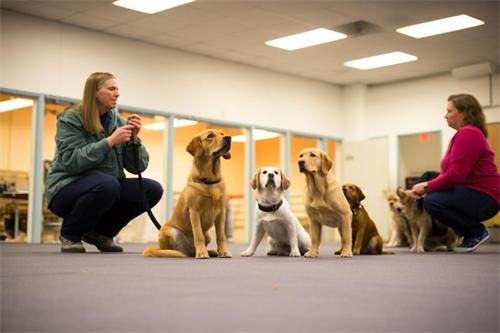The Transformative Power of Behavioral Coaching for Rescued and Senior Pets

Welcoming a rescued or senior pet into your home is a profound act of compassion. These animals often come with unique histories, including past traumas, abandonment, or simply the challenges of aging. While the decision to adopt is commendable, it also comes with the responsibility of ensuring their well-being and integration into their new environment. One of the most effective ways to achieve this is through behavioral coaching.
Behavioral coaching, especially when rooted in positive reinforcement, offers numerous benefits for both the pet and the owner. This article delves into the multifaceted advantages of behavioral coaching for rescued and senior pets, highlighting its impact on their emotional, mental, and physical health.
Understanding Behavioral Coaching
Behavioral coaching for pets involves structured training sessions aimed at modifying undesirable behaviors and reinforcing positive ones. Unlike traditional punitive methods, behavioral coaching focuses on understanding the root causes of behaviors and addressing them through compassionate and consistent techniques.
For rescued pets, this approach is crucial. Many have experienced neglect, abuse, or abandonment, leading to behaviors like fear, aggression, or anxiety. Similarly, senior pets may exhibit changes in behavior due to aging, cognitive decline, or health issues. Behavioral coaching provides them with the tools to navigate their new or changing environments confidently.
1. Building Trust and Strengthening Bonds
Trust is the foundation of any relationship, and this holds true for the bond between pets and their owners. Rescued animals, in particular, may have trust issues stemming from past experiences. Behavioral coaching helps in rebuilding this trust by creating positive associations and consistent routines.
Through patient training sessions, pets learn to associate their owners with safety and care. This not only reduces anxiety but also fosters a deeper emotional connection. For senior pets, consistent routines and positive interactions can alleviate confusion and provide a sense of security.
2. Enhancing Emotional Well-being
Emotional health is as vital as physical health for pets. Behavioral issues often stem from underlying emotional distress. Rescued pets might display signs of fear, aggression, or withdrawal, while senior pets may show signs of depression or anxiety due to aging.
Behavioral coaching addresses these emotional challenges by providing pets with coping mechanisms and a structured environment. Techniques such as desensitization and counter-conditioning can help pets overcome fears and anxieties. As a result, pets become more relaxed, confident, and emotionally balanced.
3. Promoting Mental Stimulation and Cognitive Health
Mental stimulation is essential for all pets, but it's especially crucial for senior animals. Aging can lead to cognitive decline, manifesting as disorientation, memory loss, or changes in behavior.
Engaging in regular training sessions provides mental challenges that keep the brain active and healthy. For rescued pets, learning new commands and behaviors can be a form of enrichment, preventing boredom and destructive behaviors. For senior pets, mental exercises can slow cognitive decline and improve overall quality of life.
4. Addressing Behavioral Issues Effectively
Behavioral issues like excessive barking, chewing, or litter box problems are common in both rescued and senior pets. Instead of resorting to punishment, behavioral coaching seeks to understand the root cause of these behaviors and address them constructively.
For instance, a rescued dog might bark excessively due to fear or anxiety. Through behavioral coaching, the dog can learn alternative behaviors and coping strategies. Similarly, a senior cat might urinate outside the litter box due to medical issues or stress. Behavioral coaching can help identify the cause and implement solutions that are both effective and compassionate.

5. Facilitating Successful Integration into New Environments
The transition to a new home can be overwhelming for any pet, but rescued and senior animals may find this change particularly challenging. Behavioral coaching aids in this transition by providing pets with the tools to adapt to their new surroundings.
Training sessions can focus on house rules, socialization, and adjusting to new routines. For senior pets, this might include gentle exercises to maintain mobility or training to address age-related changes in behavior. A well-structured environment helps pets feel secure and accelerates the adjustment process.
6. Improving Physical Health Through Activity
Physical activity is integral to a pet's health, but it's often overlooked in behavioral training. Incorporating physical exercises into training sessions not only improves obedience but also enhances overall health.
For senior pets, gentle exercises can maintain joint health and mobility. For rescued pets, physical activity can help burn off excess energy, reducing the likelihood of behavioral issues. Additionally, regular physical activity contributes to a healthy weight, reducing the risk of obesity-related health problems.
7. Supporting Long-Term Well-being
The benefits of behavioral coaching extend beyond immediate improvements. Over time, consistent training leads to long-term well-being for pets. Rescued and senior pets that undergo behavioral coaching are more likely to remain in their homes, reducing the risk of rehoming or abandonment.
Moreover, the skills learned during training sessions provide pets with the confidence to navigate various situations, from meeting new people to adjusting to changes in their environment. This adaptability contributes to a fulfilling and happy life.
8. Empowering Owners with Knowledge and Skills
Behavioral coaching is not just about training pets; it's also about educating owners. Through training sessions, owners learn effective communication techniques, understand their pet's needs, and develop problem-solving skills.
This empowerment leads to more confident and competent pet owners, resulting in a harmonious relationship. Owners become better equipped to handle challenges and provide their pets with the care they deserve.
9. Encouraging Community Engagement
Programs that offer behavioral coaching often involve community participation, benefiting both pets and people. For example, some animal shelters pair youths or volunteers with shelter dogs for training, providing mutual rehabilitation.
Such programs not only improve the adoptability of pets but also teach valuable life skills to participants, including empathy, patience, and responsibility. Community engagement fosters a supportive environment for both pets and people.
10. Tailored Approaches for Individual Needs
Every pet is unique, with its own history, personality, and needs. Behavioral coaching recognizes this individuality and tailors approaches accordingly.
For rescued pets, training plans are customized to address specific behavioral issues arising from past experiences. For senior pets, training is adapted to accommodate age-related changes and health considerations. This personalized approach ensures that each pet receives the care and attention it requires.
Behavioral coaching is a transformative tool for rescued and senior pets, offering a pathway to emotional healing, mental stimulation, and physical well-being. By fostering trust, addressing behavioral issues, and promoting overall health, behavioral coaching enhances the quality of life for pets and strengthens the bond between them and their owners.
For those considering adopting a rescued or senior pet, or for those already sharing their lives with one, investing in behavioral coaching is a step toward a happier, healthier future. Through compassion, consistency, and commitment, we can provide our pets with the support they need to thrive in their new or golden years.



